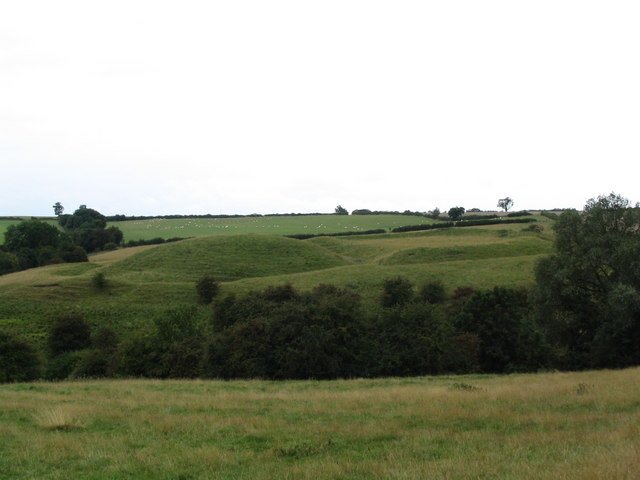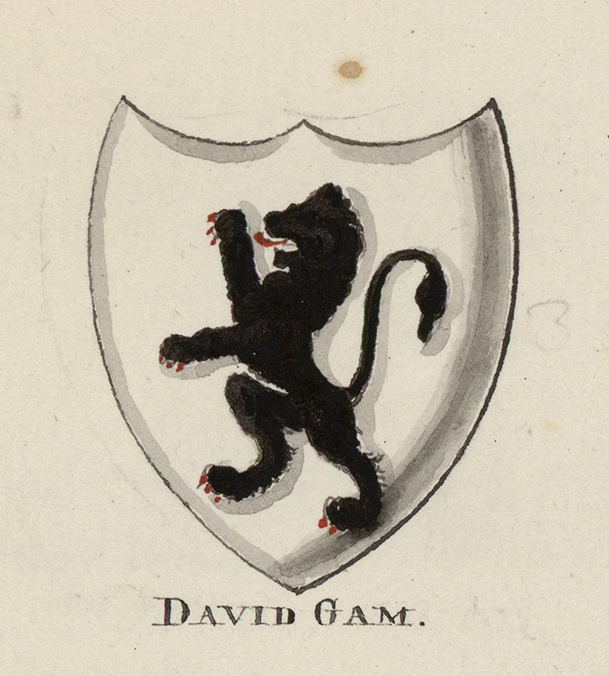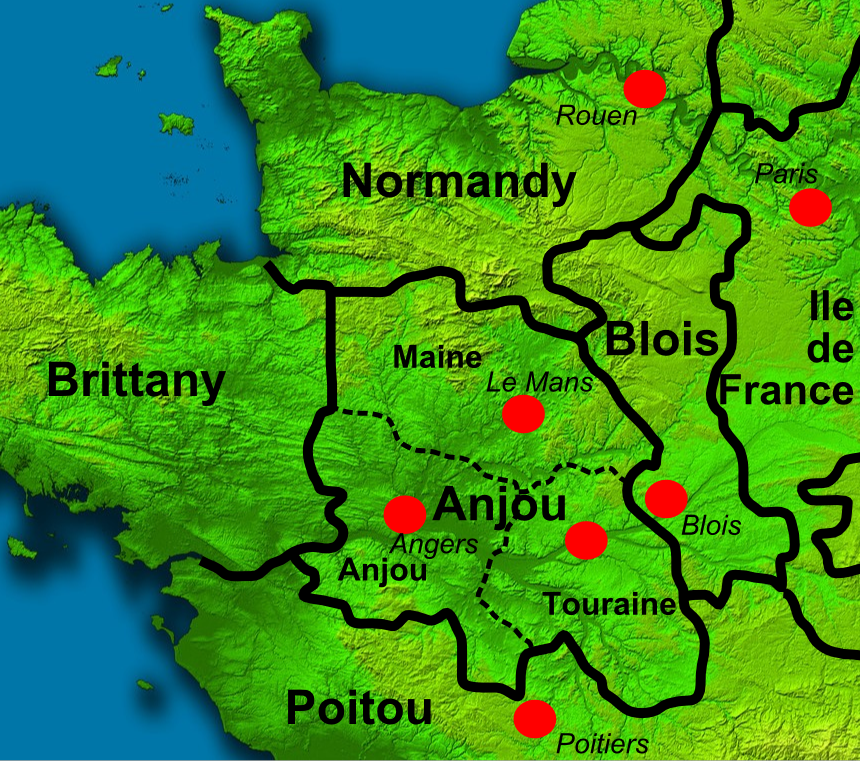|
Bredwardine Castle
Bredwardine Castle was sited in the village of Bredwardine in Herefordshire, England beside the River Wye. Thought to have been built in the second half of the 12th century. By the 15th century it had become a ruin. History Early Norman Manor Following the time of the Norman Conquest the manor was granted to John de Bredwardine. 12th Century Castle It is thought that the castle was built in the second half of the 12th century. By 1227 the castle had become the property of the Baskerville family. In the following century it was held by Hugh de Lacy. Refortification and dismantling Bredwardine Castle was rebuilt as a fortress during the wars of Stephen and Maud but then dismantled in the reign of Henry II or Henry III. In the middle of the 15th century the castle was described as being a "waste site with no annual value". The ruined castle and manor passed from the Baskerville family to the Vaughan family. Roger Vaughan was the son in law of Dafydd Gam and converted th ... [...More Info...] [...Related Items...] OR: [Wikipedia] [Google] [Baidu] |
Bredwardine
Bredwardine is a village and civil parish in the west of Herefordshire, England. Significant parish landmarks include a brick bridge over the River Wye, the historic ''Red Lion'' late 17th-century coaching inn, St Andrew's Church, and the site of Bredwardine Castle. The Wye Valley Walk passes through the village which is on the B4352 road. The name is pronounced to rhyme with "dine", and means "Brid's farm". Notable people associated with Bredwardine include Rowland Vaughan (1559–1629), the landowner and pioneer of irrigation, who was born here; Sir Charles Thomas Newton (1816–1894), the archaeologist, who was raised in Bredwardine, where his father was vicar; and Francis Kilvert Robert Francis Kilvert (3 December 184023 September 1879), known as Francis or Frank, was an English clergyman whose diaries reflected rural life in the 1870s, and were published over fifty years after his death. Life Kilvert was born on 3 ... (1840–1879), the diarist and cleric who wa ... [...More Info...] [...Related Items...] OR: [Wikipedia] [Google] [Baidu] |
Henry II Of England
Henry II (5 March 1133 – 6 July 1189), also known as Henry Curtmantle (french: link=no, Court-manteau), Henry FitzEmpress, or Henry Plantagenet, was King of England from 1154 until his death in 1189, and as such, was the first Angevin king of England. King Louis VII of France made him Duke of Normandy in 1150. Henry became Count of Anjou and Maine upon the death of his father, Count Geoffrey V, in 1151. His marriage in 1152 to Eleanor of Aquitaine, former spouse of Louis VII, made him Duke of Aquitaine. He became Count of Nantes by treaty in 1158. Before he was 40, he controlled England; large parts of Wales; the eastern half of Ireland; and the western half of France, an area that was later called the Angevin Empire. At various times, Henry also partially controlled Scotland and the Duchy of Brittany. Henry became politically involved by the age of 14 in the efforts of his mother Matilda, daughter of Henry I of England, to claim the English throne, then occupied b ... [...More Info...] [...Related Items...] OR: [Wikipedia] [Google] [Baidu] |
List Of Castles In England
This list of castles in England is not a list of every building and site that has "castle" as part of its name, nor does it list only buildings that conform to a strict definition of a castle as a medieval fortified residence. It is not a list of every castle ever built in England, many of which have vanished without trace, but is primarily a list of buildings and remains that have survived. In almost every case the buildings that survive are either ruined, or have been altered over the centuries. For several reasons, whether a given site is that of a medieval castle has not been taken to be a sufficient criterion for determining whether or not that site should be included in the list. Castles that have vanished or whose remains are barely visible are not listed, except for some important or well-known buildings and sites. Fortifications from before the medieval period are not listed, nor are architectural follies. In other respects it is difficult to identify clear and cons ... [...More Info...] [...Related Items...] OR: [Wikipedia] [Google] [Baidu] |
Castles In Great Britain And Ireland
Castles have played an important military, economic and social role in Great Britain and Ireland since their introduction following the Norman invasion of England in 1066. Although a small number of castles had been built in England in the 1050s, the Normans began to build motte and bailey and ringwork castles in large numbers to control their newly occupied territories in England and the Welsh Marches. During the 12th century the Normans began to build more castles in stone – with characteristic square keep – that played both military and political roles. Royal castles were used to control key towns and the economically important forests, while baronial castles were used by the Norman lords to control their widespread estates. David I invited Anglo-Norman lords into Scotland in the early 12th century to help him colonise and control areas of his kingdom such as Galloway; the new lords brought castle technologies with them and wooden castles began to be established over ... [...More Info...] [...Related Items...] OR: [Wikipedia] [Google] [Baidu] |
Dafydd Gam
Dafydd ap Llewelyn ap Hywel (c. 1380 – 25 October 1415), better known as Dafydd Gam, anglicized to David or Davy Gam, was a Welsh warrior, a prominent opponent of Owain Glyndŵr. He died at the Battle of Agincourt fighting for Henry V, King of England in that victory against the French. The epithet "Gam" is a soft-mutated form of the Welsh word "cam" (one-eyed, cross-eyed). As the University of Wales Dictionary notes "according to tradition, Syr Dafydd Gam (Dafydd ap Llewelyn ap Hywel Fychan) was one-eyed or cross-eyed". Regarded by Welsh nationalists as a traitor, Gam is regarded as a hero in England; his reputation has waxed and waned with those of his enemy Owain Glyndŵr and his ally King Henry V. Biography Descent Dafydd Gam was a member of one of the most prominent Welsh families in Breconshire (though the county did not exist in Dafydd's time). His recent pedigree was 'Dafydd Gam ap Llywelyn ap Hywel Fychan ap Hywel ap Einion Sais', but beyond that the family claimed ... [...More Info...] [...Related Items...] OR: [Wikipedia] [Google] [Baidu] |
Roger Vaughan Of Bredwardine
Sir Roger Vaughan of Bredwardine (died 25 October 1415), also known as Roger Fychan or Roger the younger, was a Welsh gentleman, described as having possessed wealth, rank, and high respectability. Roger's seat, Bredwardine Castle, is estimated to have been a strong and formidable fortress, located on the banks of the Wye river in Herefordshire, two miles north of Moccas Court. Bredwardine Castle is thought to have furnished much of the material for the building of Moccas Court. Lineage The 15th century Vaughan family, gentry of Bredwardine, Tretower and Hergest, were prominent in eastern Wales and the Herefordshire borderland. * According to later pedigrees, an English soldier named Walter Sais, settled near Tretower, moved to Bredwardine after marrying Sir Walter Bredwardine's daughter named Florence. * An elder son, Roger Hen (the elder) (also known as Rhoger Fawr, Roger the Great), married a daughter of Sir Walter Devereux of Weobley * Their son, Roger Vaughan, is the subje ... [...More Info...] [...Related Items...] OR: [Wikipedia] [Google] [Baidu] |
Vaughan (surname)
Vaughan and Vaughn are surnames, originally Welsh, though also used as a form of the Irish surname McMahon. ''Vaughan'' derives from the Welsh word '' bychan'', meaning "small", and so corresponds to the English name Little and the Breton cognate Bihan. The word mutates to Fychan () an identifier for a younger sibling or next of kin. It can also be used as a first name Vaughan (given name). Notable people with the surname Vaughan A *Adam Vaughan (born c. 1961), Canadian politician * Alfred Jefferson Vaughan Jr. (1830–1899), American civil engineer, planter, soldier and writer * Alden Vaughan, American historian * Anne Vaughan, Countess of Carbery (1663–1689/90) * Arky Vaughan (1912–1952), American professional baseball player * Arthur Owen Vaughan (1863–1919), English-born writer, soldier and Welsh nationalist B *Benjamin Vaughan (1751–1835), British politician *Benjamin Vaughan (bishop) (1917–2003), Bishop of Swansea and Brecon in the Church in Wales *Benji Vaughan ... [...More Info...] [...Related Items...] OR: [Wikipedia] [Google] [Baidu] |
Baskerville (surname)
Baskerville is an English people, English surname of Anglo-Normans, Anglo-Norman origin. It is believed to have been used by Normans, Norman invaders from Bacqueville (Bacqueville-en-Caux, ''Sancte Mariae de Baschevilla'' 1133; ''Baschevillam, Baskervilla'' 1155, ''Baccheville'' 1176, ''Bascervilla'' 1179) in Normandy, many of whom settled along the English-Welsh border. At the time of the British Census of 1881, Retrieved 23 January 2014 its relative frequency was highest in Herefordshire (16.2 times the British average), followed by Cheshire, Devon, Radnorshire, Oxfordshire, Brecknockshire, Cornwall, Wigtownshire, Carmarthenshire and Staffordshire. It has also been corrupted to Basketfield in some families. The name Baskerville may refer to: * Albert Henry Baskerville (1882–1908), a New Zealand pioneer of rugby league football * Charles Baskerville (chemist), Charles Baskerville (1870–1922), American chemist * Charles Baskerville (painter), Charles Baskerville (1896–1994), ... [...More Info...] [...Related Items...] OR: [Wikipedia] [Google] [Baidu] |
Henry III Of England
Henry III (1 October 1207 – 16 November 1272), also known as Henry of Winchester, was King of England, Lord of Ireland, and Duke of Aquitaine from 1216 until his death in 1272. The son of King John and Isabella of Angoulême, Henry assumed the throne when he was only nine in the middle of the First Barons' War. Cardinal Guala Bicchieri declared the war against the rebel barons to be a religious crusade and Henry's forces, led by William Marshal, defeated the rebels at the battles of Lincoln and Sandwich in 1217. Henry promised to abide by the Great Charter of 1225, a later version of the 1215 '' Magna Carta'', which limited royal power and protected the rights of the major barons. His early rule was dominated first by Hubert de Burgh and then Peter des Roches, who re-established royal authority after the war. In 1230, the King attempted to reconquer the provinces of France that had once belonged to his father, but the invasion was a debacle. A revolt led by William ... [...More Info...] [...Related Items...] OR: [Wikipedia] [Google] [Baidu] |
Empress Matilda
Empress Matilda ( 7 February 110210 September 1167), also known as the Empress Maude, was one of the claimants to the English throne during the civil war known as the Anarchy. The daughter of King Henry I of England, she moved to Germany as a child when she married the future Holy Roman Emperor Henry V. She travelled with her husband to Italy in 1116, was controversially crowned in St Peter's Basilica, and acted as the imperial regent in Italy. Matilda and Henry V had no children, and when he died in 1125, the imperial crown was claimed by his rival Lothair of Supplinburg. Matilda's younger and only full brother, William Adelin, died in the ''White Ship'' disaster of 1120, leaving Matilda's father and realm facing a potential succession crisis. On Emperor Henry V's death, Matilda was recalled to Normandy by her father, who arranged for her to marry Geoffrey of Anjou to form an alliance to protect his southern borders. Henry I had no further legitimate children and nominated ... [...More Info...] [...Related Items...] OR: [Wikipedia] [Google] [Baidu] |
Herefordshire
Herefordshire () is a county in the West Midlands of England, governed by Herefordshire Council. It is bordered by Shropshire to the north, Worcestershire to the east, Gloucestershire to the south-east, and the Welsh counties of Monmouthshire and Powys to the west. Hereford, the county town of Herefordshire has a population of approximately 61,000, making it the largest settlement in the county. The next biggest town is Leominster and then Ross-on-Wye. The county is situated in the historic Welsh Marches, Herefordshire is one of the most rural and sparsely populated counties in England, with a population density of 82/km2 (212/sq mi), and a 2021 population of 187,100 – the fourth-smallest of any ceremonial county in England. The land use is mostly agricultural and the county is well known for its fruit and cider production, and for the Hereford cattle breed. Constitution From 1974 to 1998, Herefordshire was part of the former non-metropolitan county of Hereford and Wor ... [...More Info...] [...Related Items...] OR: [Wikipedia] [Google] [Baidu] |
Stephen Of England
Stephen (1092 or 1096 – 25 October 1154), often referred to as Stephen of Blois, was King of England from 22 December 1135 to his death in 1154. He was Count of Boulogne '' jure uxoris'' from 1125 until 1147 and Duke of Normandy from 1135 until 1144. His reign was marked by the Anarchy, a civil war with his cousin and rival, the Empress Matilda, whose son, Henry II, succeeded Stephen as the first of the Angevin kings of England. Stephen was born in the County of Blois in central France as the fourth son of Stephen-Henry, Count of Blois, and Adela, daughter of William the Conqueror. His father died while Stephen was still young, and he was brought up by his mother. Placed into the court of his uncle Henry I of England, Stephen rose in prominence and was granted extensive lands. He married Matilda of Boulogne, inheriting additional estates in Kent and Boulogne that made the couple one of the wealthiest in England. Stephen narrowly escaped drowning with Henry I's son, William ... [...More Info...] [...Related Items...] OR: [Wikipedia] [Google] [Baidu] |







